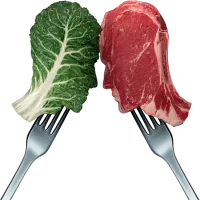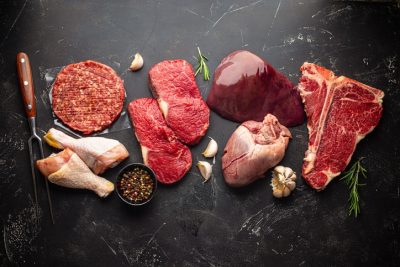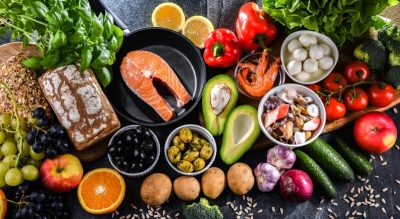Carnivore vs Vegan Diets

A Vegan vs. Carnivore Debate: Key Arguments
What would a debate between a person on a Vegan diet and a person on a Carnivore diet be comprised of?
A debate between a vegan and a carnivore could be quite heated and passionate, as both diets are deeply rooted in personal beliefs and ethical principles. Here are some potential arguments that might arise:
Vegan Arguments:

- Ethical Considerations: Vegans often argue against the exploitation and suffering of animals in the food industry. They emphasize the moral implications of consuming animal products.
- Environmental Impact: Many vegans point to the environmental damage caused by animal agriculture, including deforestation, water pollution, and greenhouse gas emissions.
- Health Benefits: Vegans often cite studies suggesting that plant-based diets can be healthier, reducing the risk of heart disease, stroke, diabetes, and certain types of cancer.
Carnivore Arguments:
- Nutrient Density: Carnivores often argue that animal products are more nutrient-dense than plant-based foods, providing essential vitamins and minerals like B12, iron, and omega-3 fatty acids.
- Natural Diet: They may contend that humans are naturally omnivores and that our bodies are adapted to consume both plant and animal foods.
- Taste and Satisfaction: Carnivores often argue that animal products provide a level of taste and satisfaction that is difficult to replicate with plant-based alternatives.
Potential Counterarguments:
- Vegan Counterarguments: Vegans might challenge the carnivore's claims about nutrient density, pointing to plant-based alternatives that can provide adequate nutrition. They may also argue that the environmental impact of animal agriculture outweighs any potential health benefits.
- Carnivore Counterarguments: Carnivores might argue that vegan diets are restrictive and difficult to maintain long-term, leading to nutrient deficiencies and health problems. They may also challenge the ethical claims of vegans, arguing that animals are a natural part of the food chain.
It's important to note that this is a simplified overview, and the debate could delve into more complex topics, such as the role of genetics, cultural factors, and personal experiences in dietary choices. Ultimately, the decision of whether to adopt a vegan or carnivore diet is a personal one, influenced by individual values, beliefs, and health considerations.
Nutritional Deficiencies in Carnivore and Vegan Diets
While both carnivore and vegan diets have their proponents, they can also present certain nutritional challenges.
Carnivore Diet Deficiencies
A strictly carnivore diet, consisting primarily of meat, fish, and eggs, can lead to deficiencies in certain essential nutrients:
- Fiber: Meat and animal products are low in fiber, which is crucial for digestive health, blood sugar regulation, and weight management.
- Vitamins: Carnivores may be deficient in vitamins like vitamin C, found in fruits and vegetables, and vitamin A, found in plant-based foods like carrots and sweet potatoes.
- Minerals: Minerals such as magnesium, potassium, and calcium, which are abundant in plant-based foods, may be lacking in a carnivore diet.
- Phytochemicals: Plant-based foods contain phytochemicals, which are bioactive compounds that have potential health benefits, such as reducing the risk of chronic diseases.
Vegan Diet Deficiencies
While a well-planned vegan diet can provide adequate nutrition, it can also lead to deficiencies in certain nutrients if not carefully monitored:
- Vitamin B12: This vitamin is primarily found in animal products, so vegans need to supplement or consume fortified foods to meet their needs.
- Iron: Iron is absorbed more efficiently from animal-based sources. Vegans may need to consume iron-rich plant foods, such as spinach and lentils, along with vitamin C to enhance absorption.
- Calcium: Calcium is primarily found in dairy products. Vegans can get calcium from fortified plant-based milk, tofu, and leafy greens.
- Omega-3 fatty acids: These healthy fats are found in fish and seafood. Vegans can obtain omega-3s from flaxseeds, chia seeds, and walnuts, but they may not be as bioavailable as those from animal sources.
It's important to note that both carnivore and vegan diets can be nutritionally adequate when carefully planned and supplemented as needed. Consulting with a registered dietitian or healthcare professional can help individuals ensure they are meeting their nutritional needs.
Food Intolerances and Conditions Exacerbated by Vegan or Carnivore Diets
Both vegan and carnivore diets can potentially exacerbate certain food intolerances or conditions.
Vegan Diet: Potential Exacerbations
- Soy Intolerance: Many vegan products contain soy, which can be a common allergen. Individuals with soy intolerance may experience symptoms like digestive upset, skin reactions, or respiratory problems.
- Nut Allergies: Vegan diets often incorporate nuts and seeds as a protein source. Individuals with nut allergies may need to be cautious about cross-contamination and hidden allergens in vegan products.
- Gluten Intolerance: While gluten-free options are widely available, some vegan products may still contain gluten. Individuals with celiac disease or gluten sensitivity should carefully read labels and choose gluten-free alternatives.
- FODMAP Intolerance: Some vegan foods, such as legumes and certain fruits and vegetables, are high in FODMAPs, which can cause digestive symptoms in individuals with FODMAP intolerance.
Carnivore Diet: Potential Exacerbations
- Red Meat Intolerance: Individuals with red meat intolerance may experience symptoms like digestive upset, bloating, or skin reactions when consuming red meat.
- Dairy Intolerance: While not strictly vegan, dairy products are often consumed alongside meat in a carnivore diet. Individuals with dairy intolerance may need to avoid dairy-containing products.
- Purine Intolerance: A carnivore diet high in red meat and organ meats can increase purine intake, which can contribute to gout in individuals with purine intolerance.
It's important to note that these are just a few examples, and individual experiences may vary. If you have any concerns about food intolerances or conditions, it's recommended to consult with a healthcare professional or registered dietitian for personalized advice.
The Mediterranean Diet
The Mediterranean Diet is often considered one of the healthiest diets in the world. It's based on the traditional dietary patterns of countries bordering the Mediterranean Sea, such as Greece, Italy, and Spain.
Key components of the Mediterranean diet include:
- Abundant fruits and vegetables: These provide essential vitamins, minerals, fiber, and antioxidants.
- Whole grains: These are rich in fiber and complex carbohydrates.
- Healthy fats: Olive oil is a primary source of healthy fats, which have been linked to various health benefits.
- Legumes: Beans, lentils, and chickpeas are excellent sources of protein and fiber.
- Nuts and seeds: These provide healthy fats, protein, and fiber.
- Fish and seafood: These are good sources of lean protein and omega-3 fatty acids.
- Limited red meat and processed foods: These are typically consumed in moderation.
- Moderate alcohol consumption: Red wine is often consumed in moderation as part of the Mediterranean diet.
Health benefits associated with the Mediterranean diet include:
- Reduced risk of heart disease
- Lower blood pressure
- Improved blood sugar control
- Reduced risk of stroke
- Lower risk of type 2 diabetes
- Weight management
While the Mediterranean diet is widely considered healthy, it's important to note that individual needs and preferences may vary. It's always recommended to consult with a healthcare professional or registered dietitian to determine the best dietary approach for your specific circumstances.
Other healthy diets that have gained popularity include:
- DASH diet: Designed to lower blood pressure.
- Flexitarian diet: Emphasizes plant-based foods but allows for occasional consumption of meat.
- Whole30 diet: A 30-day elimination diet focusing on whole, unprocessed foods.
Ultimately, the healthiest diet for you is one that you can adhere to long-term and that provides you with the nutrients your body needs.



